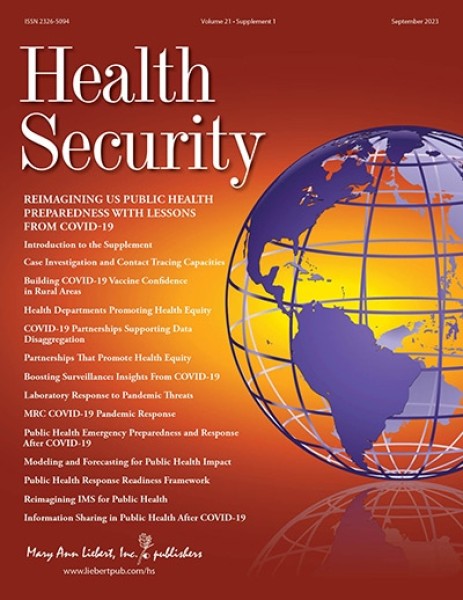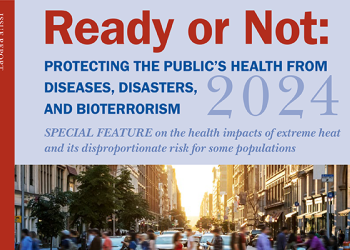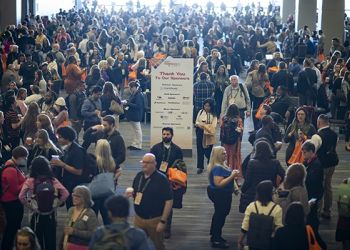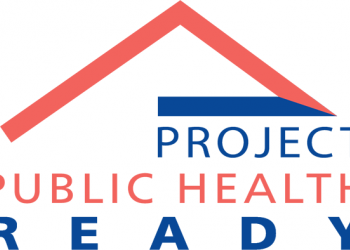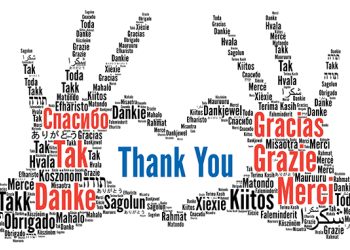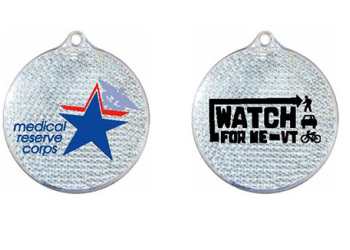NACCHO, on behalf of the Planning Committee for the 2022 Preparedness Summit, is pleased to share the publication of a special supplement to the journal Health Security. The supplement, “Reimagining US Public Health Preparedness with Lessons from COVID-19,” was structured to codify the findings of listening sessions held during the 2022 Preparedness Summit and validate the experiences of the public health preparedness practice community in response to the COVID-19 pandemic.
The open-access supplement features 14 papers, all of which are available online.
Click here
to view the full supplement or on titles below to access individual papers:
- Reimagining Preparedness in the Era of COVID-19
- Case Investigation and Contact Tracing in US State and Local Public Health Agencies: Sustaining Capacities and Applying Lessons Learned From the COVID-19 Pandemic and 2022 Mpox Outbreak
- Engaging Community-Based Organizations to Address Barriers in Public Health Programs: Lessons Learned From COVID-19 Vaccine Acceptance Programs in Diverse Rural Communities
- New York State, New York City, New Jersey, Puerto Rico, and the US Virgin Islands’ Health Department Experiences Promoting Health Equity During the Initial COVID-19 Omicron Variant Period, 2021-2022
- Importance of Public and Private Partnership Supporting Data Disaggregation to Measure Racial, Sexual Orientation, and Gender Identity Disparities in COVID-19
- Strengthening the Partnerships That Promote Health Equity and Social Justice
- “Boosting” Surveillance for a More Impactful Public Health Response During Protracted and Evolving Infectious Disease Threats: Insights From the COVID-19 Pandemic
- Laboratory Response to Pandemic Threats: Challenges, Needs, and Solutions
- Recognizing the Impact of Medical Reserve Corps Volunteers on the COVID-19 Pandemic Response
- Public Health Emergency Preparedness and Response After COVID-19
- On the Mark: Modeling and Forecasting for Public Health Impact
- New Challenges, Evolved Approach: The Public Health Response Readiness Framework
- Reimagining Incident Management Systems for Public Health Responses
- Strengths, Weaknesses, and Catharsis: The Role of Information Sharing in Public Health After the COVID-19 Response
The closing of the supplement’s introduction, excerpted below, provides an overview of the supplement’s contents.
Excerpt from the supplement’s introduction:
The 2022 Preparedness Summit listening session summary findings were consistent overall with the gaps outlined in the National Academy of Medicine report, which identified funding, workforce training, partnerships, equity, and limited technology as areas for national consideration by legislators and government leadership. What the organizers of the Preparedness Summit found surprising were the emotions and camaraderie displayed by session attendees, likening it to a large “therapy” session. Pickett’s commentary on the catharsis of information sharing discusses this finding in detail.
This supplement of Health Security was structured to codify the findings of the listening sessions and validate the experiences of the public health preparedness practice community in response to the COVID-19 pandemic. This was not a small feat and took the effort of dedicated professionals who understood the value of publishing their experiences to build the evidence base for future responses. As practitioners who have been exhausted by the physical and mental toll of response efforts over the past 3 years, the effort of finding not only time but also the mental clarity to reflect back on their experiences with a critical lens to reimagine the future should not be underestimated. Furthermore, writing critically with a scientifically academic style is generally not in a practitioner’s skillset. This speaks to a need to reinvigorate academic–practice partnerships, such as those advocated for by the Council on Linkages Between Academic and Public Health Practice, where academia, healthcare, and public health professionals collaborate for training, education, and research, to leverage each sector’s strengths for the better.
Also featured in this supplement is a series of commentaries from organizations representing different sectors of the public health practice community, including Wolford et al discussing the importance of public health laboratories to response, Hawkins et al highlighting the experiences of the state health departments and discussing how to reimagine incident management systems, Burns et al observing the contributions of Medical Reserve Corps volunteers, and Hoff et al sharing reflections from local health departments and how they can inform improvements necessary to ensure we are better prepared for the next pandemic.
Equity issues underpinned all of the findings and are represented in the supplement. Auerbach and Chen outline new approaches for working with and funding community-based organizations representing historically marginalized sectors of the population. Case studies by Cox et al and Evans et al, respectively, provide in-depth investigations by state and territorial health departments and the CDC Foundation to incorporate health equity concerns in the response.
Data in all of their permutations and uses was another theme of the listening sessions that is represented in the supplement. Qasmieh et al identify existing surveillance gaps despite the use of routinely and strategically deployed population-representative surveys. Panaggio et al investigate new modeling techniques for operational decision making. Woodward and Rivers focus on models for contact investigation versus contact tracing, while Powell et al look at the limitations of the US public health data systems with a health equity lens.
Finally, as William Wordsworth is often quoted: “Let us learn from the past to profit by the present, and from the present, to live better in the future.” The lessons learned by practitioners as outlined in this supplement are intended to inform government agencies and legislators across the country who are responsible for guiding future governmental public health response efforts. The commentary by Noelte et al on the Public Health Response Readiness Framework does just that by laying out a new framework for improving response efforts across the country.
Click here to view the full supplement.
